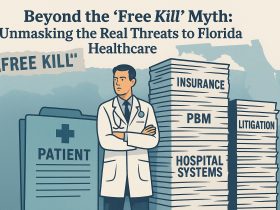Across Florida, a silent crisis is unfolding—one that affects patients, doctors, and the very foundation of our healthcare system. Recent data from Polk County starkly illustrates the reality: a survey of over 2,000 residents found that 42% needed health care but were unable to receive it in the past year. While there are many systemic factors driving this gap, a deeper and more human issue lies at the heart of it: a growing shortage of doctors, increasingly driven by burnout.
Florida’s Widening Gap in Access
Polk County is not an outlier—it’s a microcosm. Florida’s population continues to grow, especially among older adults with complex health needs. Yet the pipeline of physicians and other clinicians has not kept pace. Primary care, behavioral health, and specialty services are stretched thin, particularly in rural and underserved areas. Wait times are rising. Continuity is fracturing. And patients are left delaying care or forgoing it altogether.
This is not just a logistical failure. It is a public health emergency.
The Burnout Factor: Breaking the Backbone of Care
A major, although underacknowledged, driver of this shortage is the burnout epidemic within the medical profession. Behind every closed practice, early retirement, or reduced schedule is often a doctor who has reached the limit of emotional, psychological, and physical capacity.
Burnout in medicine is not new, but it has reached dangerous new heights. Physician suicide now leads all other professions in the United States. It’s a staggering statistic—made even more alarming by how rarely it enters the public discourse.
This crisis isn’t about weakness. It’s about the crushing pressure to see more patients in less time, often under rigid administrative oversight and electronic health record systems that turn healers into data clerks. It’s about the loss of autonomy, the fragmentation of care, and the increasing sense that doctors are replaceable cogs in an impersonal machine. Most painfully, it’s about the slow death of the “why”—the sense of purpose, compassion, and connection that brought so many of us into medicine in the first place.
Systemic Problems Require Systemic Solutions
If Florida is to confront its doctor shortage, it must do more than recruit new professionals. We must retain and support the ones we already have. That means:
• Redesigning care delivery to emphasize team-based models and appropriate patient loads.
• Investing in mental health support and destigmatizing help-seeking among clinicians.
• Restoring meaning and autonomy to the practice of medicine—by allowing doctors to spend more time with patients and less time on bureaucratic tasks.
• Reforming payment and incentive structures to value quality over volume.
Polk County’s 42% unmet care rate is more than a statistic. It represents thousands of real people—parents, children, seniors—who were left without the care they needed. And it also represents the untold number of doctors who are burning out, stepping away, or suffering in silence, caught in a system that too often fails to care for the caregivers.
The time for awareness has passed. The time for action is now.







Leave a Reply